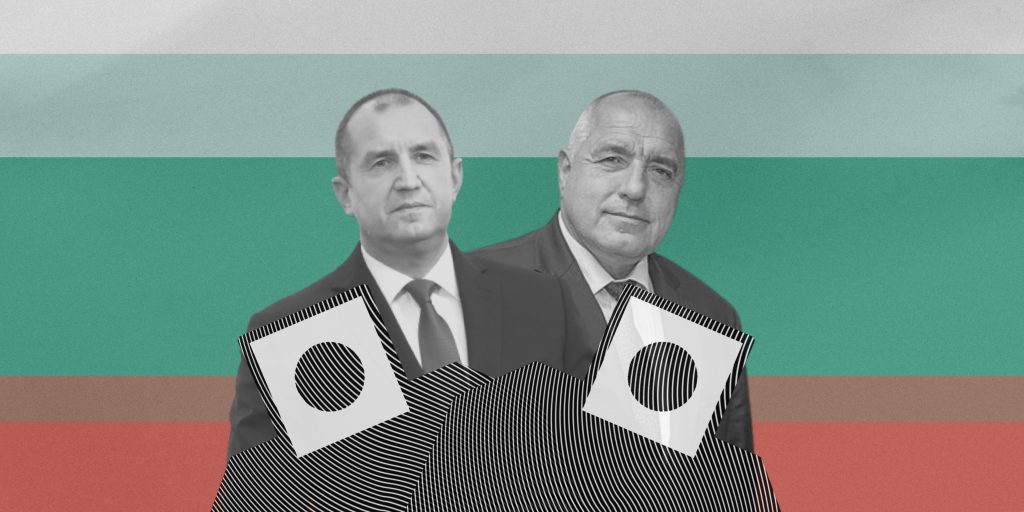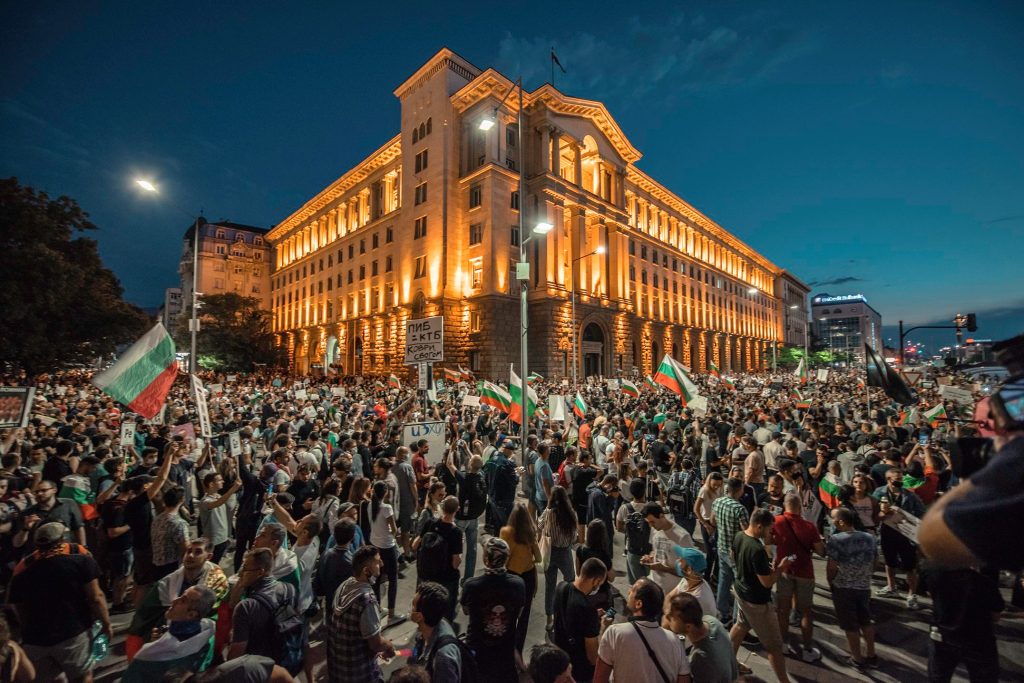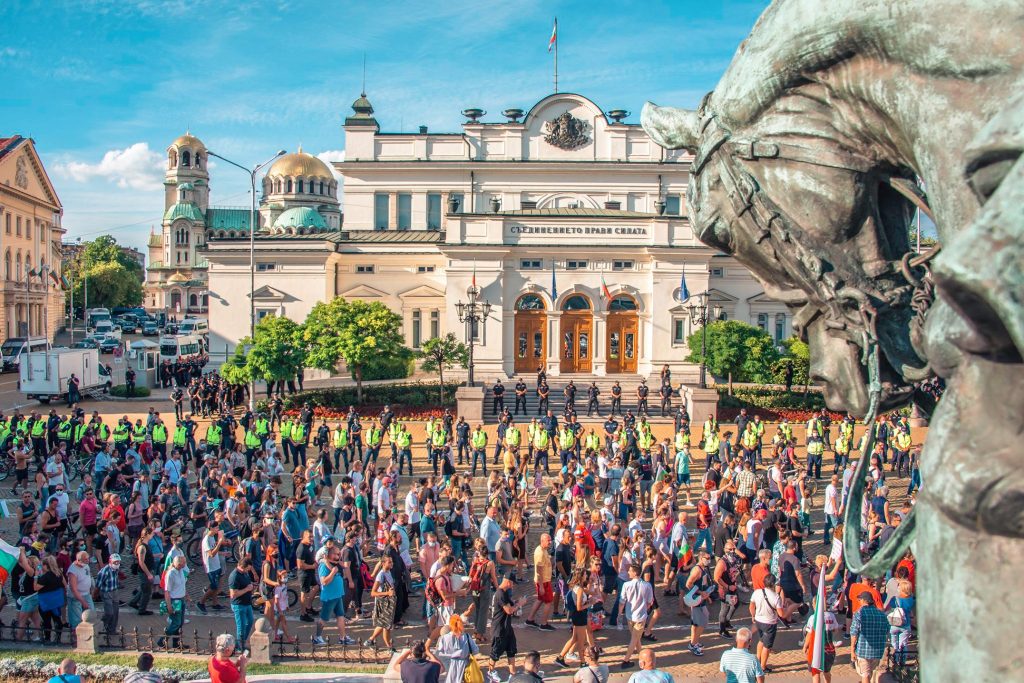The Bulgarian showdown – a nation on the ropes
12 November 2021 /
Stoycho Velev - European Waves 10 min

Amidst a growing COVID-19 pandemic, Bulgaria is heading towards a historic 2-in-1 election- for both parliament and presidency. Despite its unquestionable significance, the idea of a third election this year is hardly met with particular excitement among the voters. Having failed twice to form a stable government, the country’s notorious political figures will find it extremely challenging to tempt a disenchanted electorate.
Nowadays, a statement that the politically exhausted Bulgarian people share a mutual feeling of indifference towards the nation’s political course may not seem that far-fetched. Entering a third election cycle in the past six months and lacking a solution to the alarming surge of COVID-19 cases across the country, Bulgaria finds itself once again teetering on the brink of a perilous political crisis and in dire need of a savior. Nevertheless, voters should probably proceed with caution when reaching for the ballot on the 14th of November, as the country’s current political market seems to offer alluring, but cheap promises of salvation.
A status-quo ‘worthy of protection’- a political backstory
Similar to the rather inconclusive outcome of the previous elections- in April and July respectively, political leanings in Bulgaria remain difficult to measure. No one is better placed to know that than the former and third times Prime Minister Boyko Borissov, who dominated the country’s politics for the best part of a decade as a leader of the center-right Citizens for European Development of Bulgaria (GERB). Despite suffering a major upset caused by the newly produced political project There Is Such A People (ITN) several months ago, as things stand, Borisov is yet again ahead in the polls. ITN- a big-tent populist party led by the singer and talk-show host Slavi Trifonov (a Beppe Grillo political lookalike), emerged triumphant in July by some fifteen thousand votes. A slim margin, but just enough to see Borisov lose a general election for the first time in nearly twelve years.

However, the somehow popular assertion that Trifonov’s project, whipped up by his own media, was to bring about the much-anticipated change to the country’s political landscape was perhaps ill-judged. ITN failed to benefit from months of protests when Bulgarians took to the streets after multiple scandals pointed at Prime Minister Borisov’s alleged ties with Bulgaria’s Chief Prosecutor Ivan Geshev, who is believed to have been more than cooperative when strong-arming Borisov’s opponents. And if the actions of the prime minister’s government until this point could have been described as ‘playing with matches’, then Geshev’s latest moves have probably set the whole political stage on fire.
On the morning of July 9th, 2020 prosecutors practically raided the office of Bulgarian President Rumen Radev’s secretary on legal affairs and his advisor on security and defense, thus triggering an instant reaction from the head of state, who the very same day held a speech in front of the presidency condemning the attack on the institution. That particular decision in the long term proved to be a major catalyst for the 2020-21 anti-government protests, as activists flooded the country’s main cities to take part in the demonstrations which lasted for 282 days. Although public protests failed to topple Borisov’s government in the end, some may argue that GERB’s political legitimacy has severely weakened since then.

The mere fact that ITN failed to capitalize amid GERB’s greatest downfall may well be one of the reasons the party breeds massive distrust at the moment, as its electorate begins to realize it has easily fallen victim to nothing but sly political posturing. After weeks of dithering over his next move, Trifonov turned his back on every approach made by potential political allies and refused to form a government that would ultimately exclude GERB. Only a couple of months have passed since then and the tables have already turned. ITN’s momentum is gone along with the effervescence within the party, and Trifonov’s disengagement from the current campaign will not augur well with the voters. Him dictating the rules once again and having a seat at the table regarding a possible coalition now seems highly improbable. Looking back, Borisov may have survived yet another challenge. Unless his party’s foes think otherwise…
Coming together – a leftist formula
Straight-up populism appears to have denied Bulgarian people the much-needed solution to some of the crucial issues the country is facing. There is hardly any reason to worry though, as political messiahs are largely produced in that part of the European Union. Recent polls suggest ITN’s runner-up spot has quickly been taken by the center-left ‘We Continue the Change’ (PP) party- a newly established political project associated with the current president Radev. Carrying a colorful, somewhat gaudy name, PP is seen as the parliamentary continuation of the president’s considerable influence throughout the country. After Borisov’s rule came to an end in April, the president, fulfilling his constitutional obligations, appointed a caretaker government the actions of which have been overwhelmingly approved by the majority in the past few months. A certain political duo particularly stood out – Kiril Petkov (Minister of Economy) and Asen Vasilev (Minister of Finance), both Harvard graduates, gained significant attention by bringing the former government’s suspicious dealings to light. Building on that, their project aims at finishing off the job and eventually causing a rapid change of direction for the country, as they feel history turning their way.
Over the last few decades, as far as history is concerned, one party simply cannot be overlooked. The Bulgarian Socialist Party (BSP) does not exactly bring political vibrancy to the buffet of possible solutions, nor does it represent an alternative to the status-quo that drew people to the streets recently. Moreover, the ever-growing discontent towards the left in the previous years showed in the last elections, which once again put Korneliya Ninova– the party’s beleaguered leader, under major pressure. As much as BSP may look at PP as a potential partner, the newest political project also represents a threat to the socialists mainly because of its modern ideological approach which resonates better with young progressive voters. Despite introducing a platform built on social policy, Ninova’s party has adopted a much more conservative attitude, which carries a distinctive nationalistic nuance at times.
Nevertheless, a partnership between the socialists and the so-called new center-left seems logical, although the unwillingness to acknowledge such deep ideological differences early on may turn out to be a recipe for future political turbulence. A contestant as experienced as the socialist party may promise to act sensibly at first, but a leopard rarely changes its spots. If a stable government is to endure, moderates in parliament should probably seek their allies elsewhere.
The liberal tide: a political make-or-break
In spite of the president playing a vital role in the highly anticipated social ignition last year, many would argue that alongside his actions yet another event of an equal political magnitude occurred. Just a week before the streets of Sofia erupted in demonstrations, a rubber boat landed on a beach some 400 kilometers from the capital. On its bow stood Hristo Ivanov, the leader of the ever so popular Democratic Bulgaria (DB). This political alliance consisting of three separate parties- Yes, Bulgaria!, Democrats for a Strong Bulgaria, and The Green movement- represents what many perceive as the liberal bloc in the country.
The purpose of the landing was to plant a Bulgarian flag on a beach which, although public property by law, had been used for years as a private base by Ahmed Dogan– a former head of the country’s ethnic Turkish party DPS and yet another notorious political figure associated with Borisov. Infamous for his muddy, decade-long involvement with underground politics, for many Dogan is the uncrowned king of a ‘cadre of oligarchs’ which has effectively established a parallel state in Bulgaria, exerting power through business, the judiciary, the media, police, and security apparatus. Pumping corruption through the country’s institutions and a common face on the street placards during the protests, many consider him to be the ultimate behind-the-scenes politician who embodies the very idea of a captured state. Ivanov, after getting slightly roughed up by the local security guards, was eventually denied entrance to the area within the beach. This ultimately led to a series of violent clashes with the police a few days later when liberal activists shouting ‘’Not against ethnicity, but against the mafia!’’ made their way through the unlawfully set up roadblocks and fences to make their statement. Only a few hours’ drive west, crowds were already gathering outside parliament.

The somewhat symbolic stance against ‘’the mafia’’ adopted by the president and the liberal alliance eventually became a social trademark of the nationwide demonstrations last summer. Ever since then, the liberal bloc has witnessed a major increase in its political stocks as distrust in Borisov and GERB skyrocketed. However, coalition talks with the populist ITN and the socialist BSP disappointingly broke down after the last election, as the solution to the country’s political problems proved to be more elusive than ever. In theory, the new center-left PP was thought to make a suitable partner for the liberals, though recently its existence seems only to heighten hostilities.
Timing would be delicate for Democratic Bulgaria. Should they play their cards right the party might just become a more permanent part of parliament. Otherwise, the road may well lead toward marginalization once again. Regardless of the current political impasse, the sheer threat of a third failure of producing a stable government amplifies the need for GERB’s opponents to come forward and make certain concessions if the country is to avoid a constitutional crisis. And while political bargaining and scuffling continue, a contest on a national scale with a taste of personal vendetta is close to eruption.
The long-overdue head-to-head clash
Based on its constitutional grounds, the presidential institution of Bulgaria can hardly be described as one with a broad collection of political and legal instruments to pave the way forward for the person in office. However, it embodies the unity of the nation, its dealings often carry a lot of clout and its strength, although symbolic at times, plays its part when required. Nevertheless, maintaining political balance in a country with questionable institutional autonomy when it comes to government influence will be a heavy burden to bear as it will require a significant amount of political guts. If that balance is tipped too far, a war between institutions emerges, as has been the harsh reality for Bulgaria in the past few months. Proven to be a bulwark against the former government’s actions, the current president Radev has confidently entered the competition, while Borisov will need to subside his visceral fears if he is to win the race that may decide the country’s political course for the next 5 years.
As things stand, the incumbent president is projected to comfortably reclaim his office within the two-round election. Although he was hardly expected to break a sweat during the presidential race, a rather insightful tactical maneuver by Borisov has shifted the tectonic plates of the campaign once again. By putting forward the solid candidacy of the highly esteemed rector of Sofia University prof. Anastas Gerdjikov, the former prime minister has once again brought about a sense of intrigue into the fight. There is no room for error in the president’s camp as securing the position is of vital importance if GERB and Borisov are to be properly threatened once again. Future political balance is hanging by a thread and it might not be too bold to claim that the parliamentary election hinges on the presidential one, as there is no question both of them will substantially shape the country in the long term.
A nation at the crossroads
To put it mildly, the path to political stability in Bulgaria seems arduous. It would be naive to assume that the upcoming election will bring about a complete denouement of the prolonged crisis the country has been spiraling into for a long time now. Every attempt of the representatives of the status-quo to re-establish their influence and bludgeon others into compliance will probably reignite protests. On the other hand, a fragmented parliament will perhaps mean a fragile and disreputable majority that would only be subjected to further criticism. Yet again, populist traps lie ahead in large numbers as constructive policies and broad coalitions remain tough-to-sell ideas in the country. In the end, a public environment still excessively suitable for charismatic leaders and promising saviors eventually makes for fluid politics. This is why effective solutions to political crises can seldom be stood up by mere sentiment and low-cost populist entertainment. Hopefully, Bulgarians are not to learn that the hard way.
